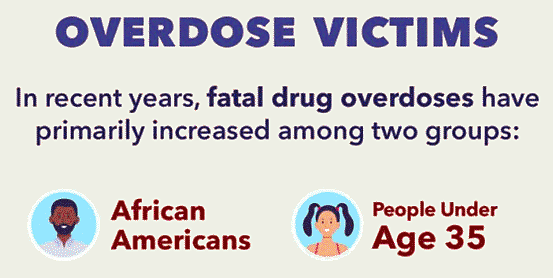The opioid overdose epidemic in Mississippi started in the late 1990s with a dramatic increase in deaths from prescription opioids. This epidemic continues today, driven by overdose deaths from synthetic opioids, particularly fentanyl.
Properly prescribed, opioid medications and stimulants can be effective — but like any drug, they can also be abused. Whether produced legally or illegally, just a small dose can be deadly in the right circumstances.
MSDH's Opioid and Substance Use Disorder Program works to prevent overdose deaths in Mississippi and end the drug overdose epidemic in the state.
Naloxone can reverse an overdose from opioids, including heroin, fentanyl and prescription opioid medications. Naloxone is also known as Narcan, Kloxxado, Zimhi and Rivive.
If you or someone you know is at an increased risk for opioid overdose, you should carry naloxone and keep it at home.
Naloxone is available by requesting a prescription from your local pharmacist, or by asking for its non-prescription form (Rivive). The pharmacy will charge you retail price, or a co-pay if it is covered by your insurance.
Get a free naloxone kit by requesting it from the Mississippi State Department of Health. Your kit will be mailed directly to you at no charge.
Free Treatment for Opioid Use
MSDH now offers free medication-assisted treatment for Mississippians with opioid use disorder. If you're 15 or older and think you may have an opioid use problem, or you are a healthcare provider making a referral, make an appointment.
- Request an appointment nowFor individuals or healthcare provider referrals
- Learn more
The Opioid Overdose Epidemic
In Mississippi, overdose deaths rose sharply in just two years, almost doubling from 2019 to 2021. The number of deaths involving synthetic opioids such as fentanyl spiked by 51% just from 2020-2021.
Alarmingly, one out of every three overdose deaths in 2021 was among people younger than 35 years of age. Although the majority of overdose fatalities were among whites, the proportion of overdose deaths among African Americans in 2021 increased, continuing a trend first observed in 2019.
The collision of two parallel epidemics — the COVID-19 crisis and increased use of fentanyl and fentanyl-contaminated drugs — was a major factor in the steep rise in overdoses during the 2020-2021 period.
Who Is at Risk
- Males: The proportion of male overdose deaths has been increasing. In 2021, nearly two-thirds of overdose deaths were among males.
- Younger Mississippians: Overdose deaths in those younger than 35 has risen by 158%, a dramatic increase from 99 in 2019 to 255 in 2021.
- African Americans: The proportion of overdose deaths among African Americans has been steadily increasing since 2011.

What You Can Do
Prevent Access to Your Drugs
![]() Store prescription drugs securely. Keep track of how much of each prescription you should have, and keep drugs in a locked medicine cabinet if possible.
Store prescription drugs securely. Keep track of how much of each prescription you should have, and keep drugs in a locked medicine cabinet if possible.
![]() Dispose of medications properly once treatment is completed. You can take unused drugs to a pharmacist or disposal site, or follow safe disposal steps at home.
Dispose of medications properly once treatment is completed. You can take unused drugs to a pharmacist or disposal site, or follow safe disposal steps at home.
Act Quickly in Case of Overdose
- Call 911 as soon as possible.
- Give naloxone (Narcan) if it's on hand.
- Keep naloxone ready if you or someone you know may be at risk of an overdose.
Get Help and Get Informed
There's educational information and help available from state and national sources.


